#edinburgh physics
Text
It's #LoveHornbillsDay!


Plates from Edinburgh Journal of Natural History and of the Physical Sciences via Biodiversity Heritage Library:
Vol. 1 (1835-9), XCIX.B
Vol. 2 (1839-40), XCIX
#animals in art#animal holiday#european art#birds in art#illustration#bird#birds#19th century art#Edinburgh Journal of Natural History and of the Physical Sciences#BHL#Biodiversity Heritage Library#lithograph#book plate#scientific illustration#natural history art#ornithological illustration#hornbill#hornbills#ornithology#Love Hornbills Day
14 notes
·
View notes
Photo
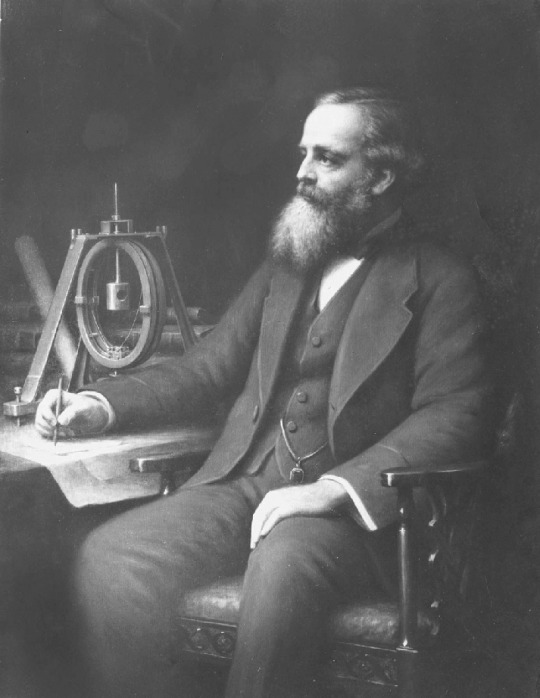
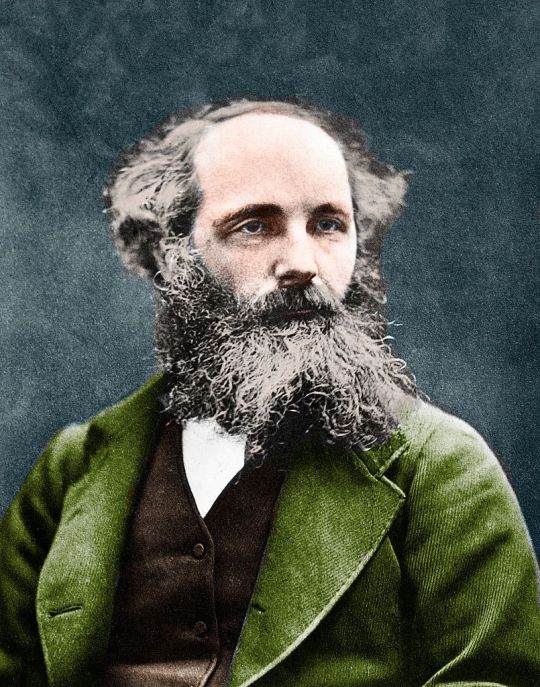

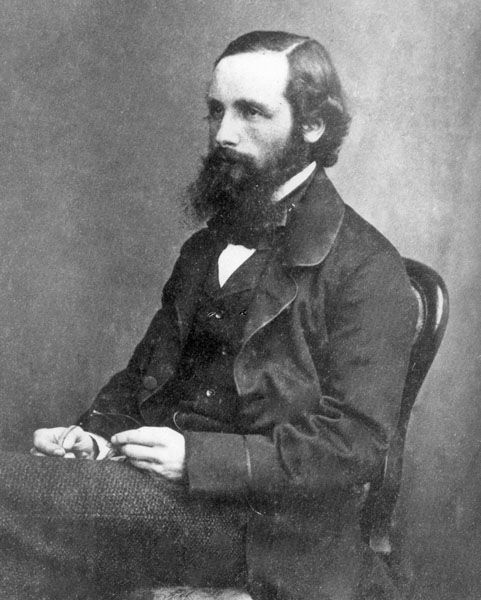
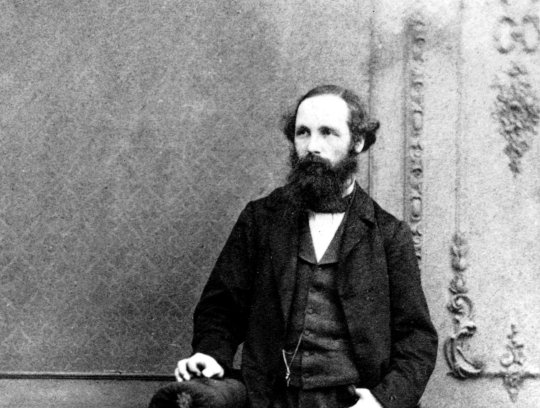
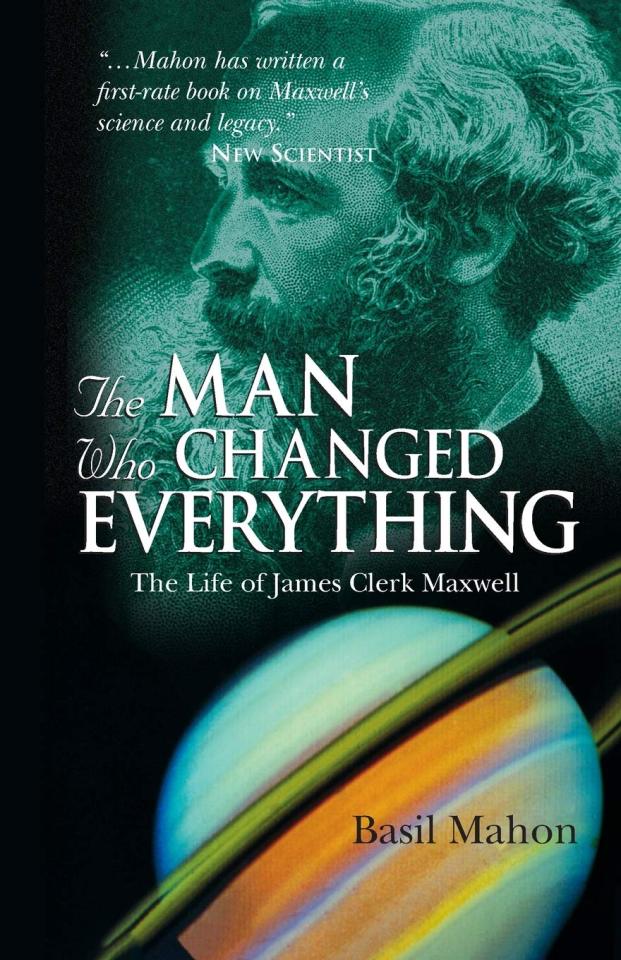
On June 13th 1831 James Clerk Maxwell was born in Edinburgh.
It’s difficult to understand why this guy is still hardly known by ordinary Scots, but is one of the most influential scientists of all time. Albert Einstein acknowledged that the origins of the special theory of relativity lay in Clerk Maxwell’s theories, saying “The work of James Clerk Maxwell changed the world forever”.
Now I don’t pretend to know about science, the calculations involve make my head hurt, but I do know that James deserves his place at the top table of scientists past and present, and probably the future too. The praise heaped on him from many of the most eminent scholars is phenomenal.
Nicknamed “daftie” by his fellow pupils at Edinburgh Academy, earned by wearing home-made shoes on his first day, he went on to predict the existence of radio waves in 1865, and is considered by many to be the father of the science of electronics, he also found time to teach, and if you recall he taught yesterdays birthday boy astronomer, David Gill.
Born in Edinburgh in 1831 he attended school in the city and later studied at the Universities of Edinburgh and Cambridge. He was a very curious child, and this might amaze you, but he wrote his first scientific paper at the age of just 14, at the age of 25 he became Professor of Physics at Aberdeen University’s Marischal College.
Clerk Maxwell’s research into electromagnetic radiation brought about many of the things we know today like television, mobile phones, radios and infra-red telescopes. The largest astronomical telescope in the world, at Mauna Kea Observatory in Hawaii, is named in his honour, this is an indication of his standing to this day as a scientist.
In 1873 he created the four Maxwell equations. They are very complicated and you would have to be a scientist to figure them out. But these four theories played a very important role in Albert Einstein’s work on the special theory of relativity. Einstein praised him and said, “The special theory of relativity owes its origins to Maxwell Equations of the electromagnetic field.” Clerk Maxwell’s discovery of the nature of electromagnetic waves forms the basis for much of the modern technological society we take for granted. Radio, television, satellite communications and the mobile phone have their origins in his work.
In 1879, James Clerk Maxwell’s health began to fail. Following a summer visit to the family estate in Kirkcudbrightshire, he returned to Cambridge where he died on 5th November that year.
12 notes
·
View notes
Photo

1 note
·
View note
Text
Crowley did not want the holy water as a suicide pill in 1862, but I believe he not not wanted it as one
He gets pulled down to hell in 1827 and it's not just a slap on the wrist for something minor, he did a very good deed—that didn't just cost them one soul, it has ripple effects! It cost them dozens if not more, depending on what Elspeth did with her life.
Additionally, we do not know how long he stayed in hell. "Quite some time" is not a very exact measurement, and I know there are theories that it wasn't long at all, but that's pure speculation.
Canonically, the next time we see him is in 1862, so assuming he took some time to adjust to the new period, he could have come back as late as 1861. It is entirely possible—and in my opinion very likely—that he spent over thirty years being tortured in hell.
By "torture" I do mean actual torture, btw, the same kind hell threatens him with. In the scriptbook, there's a deleted monologue Dagon has while Crowley is getting rejected (again).
They save the wonderful line "Because no matter what agonies the damned are suffering, Crowley, you will have it worse. We SEE how hell tortures the damned, Furfur literally plays it to us like a corporate powerpoint, so whatever they did to him after '27 was bad.
Crowley looks tired, exhausted, almost sick. He is paranoid, in mental and/or physical pain, he looks like he has lost weight, and we barely see him move at all.
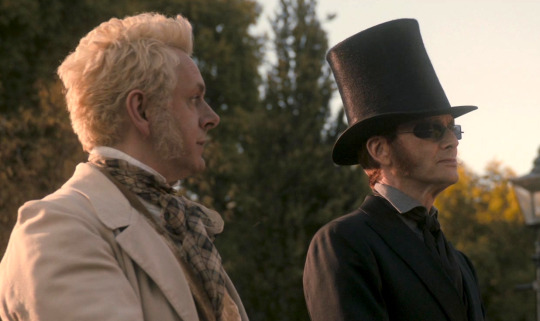
Now compare to the Crowley we saw in Edinburgh. Carefree, happy, taking Aziraphale on dates and going on fun little adventures, getting drunk on laudanum, smiling, jumping around—this is the most relaxed we have seen him since around 1601.
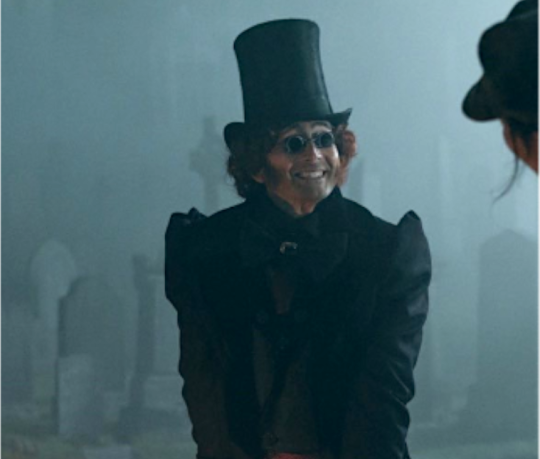
After this, we never see him like that again. That bouncy, curly-haired demon is gone, and hell is responsible; they broke him. I know that look on his face in '62, I saw it every day in the mirror for twenty years, which were (also honestly quite literally) torturous.
Crowley asked for the holy water as insurance, he had probably already come up with several contingency plans involving.
What would happen if they still got him though? What if he erased a demon or two and then hell dragged him back down? I am 100% certain that Dagon would have made good on the promise they give him later. If it had come down to killing himself with holy water or being tortured for all eternity, he would have chosen death without hesitation.
Better dead than in hell.
#alex talks good omens#good omens#ineffable husbands#crowley#crowley meta#good omens meta#aziraphale#good omens season 2#go2#aziracrow
723 notes
·
View notes
Text
Simon ''Ghost'' Riley — Masterlist 💀🖤
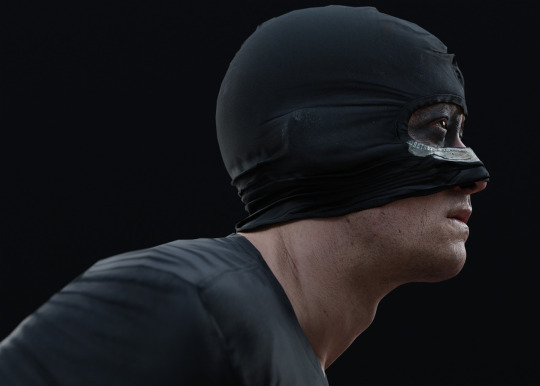

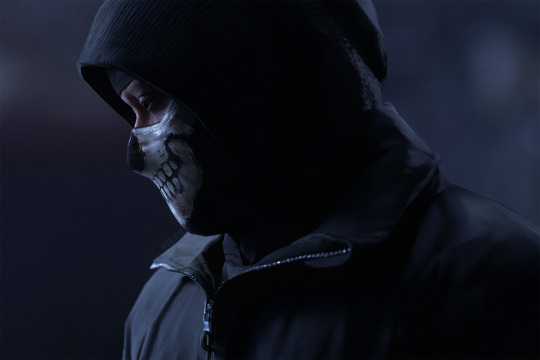
cr: @ave661
Simon Riley Moodboard | Smut Masterlist | Bimbo!Reader Masterlist | Dad!Ghost Masterlist
This Masterlist only has the material I've created in 2024. To explore older works, you can check my Main Masterlist, or use the tags #Simon Riley x Fem!Reader or #Ghost mw2 on my profile to access all my works!
Do not translate, post, or put my content into AI tools.
Ongoing Series
Lorelei
Synopsis: Aware of the way his lifestyle doesn't align with your dream life and unwilling to quit his life as a soldier, Simon breaks things off with you. It isn't until a year later that he sees you again, a tiny carbon copy of him held in your arms.
K-9
Simon Riley and his pathetic efforts to get close to the new medic will earn him a scar or two
or
Simon Riley is in love with an uninterested, tired medic.
Angel
Synopsis: Afraid of giving you the same destiny all his loved ones met, an emotionally unavailable Simon does his best to pretend being in love with you for one night, later deciding to introduce you to the one person who can give you the love you want; John Price.
Smut
Silly love-making
Simon's obsession with pornstar!reader
Sex on camera
No man could act this good
Using his naked body for art purposes
Love-making
FWB!Simon cucking your hookup
Tattoo Artist!Simon
Prettiest girl in Edinburgh
Hybrid cat!Reader tag teamed by Simon and Johnny
Soul-crushing devotion and medical emergencies
AI!Reader gets a physical body
Neet!Reader jerks him off
Hybrid wolf!Simon x Catgirl!Reader
Sleep-walking, but fucking instead
Simon becomes vocal when give him blowjobs
Rimming him
Monster fucker
Dick headcanons
Catgirl in heat
Drabbles
Gym bros Johnny and Simon
Creature!Reader
Tag team 🌶️
Simon Riley is a stray, roughed up cat
Seduction goes against the rules
Nymphomaniac!Reader
Immortal!Reader
The phrase ''the wife'' is always in Simon's mouth
Choking🌶️
Cock warming🌶️
Lipstick marks on his cock
Neet!Reader sniffing his armpits
Milf!Reader drives Simon insane🌶️
Military high ranked!Reader
What turns him off
I have no faith, but I believe in you
You and your daughter love his tattooed arm
Simon is a furnace
Creature!Reader cuddles
Asking for sex after he had a bad day
Cumming too early🌶️
Wearing a white wife beater
Girl dad
Raccoon
Simon makes weird faces under the mask
Juiciest ass in the Task Force
Bulking
Dating a MILF
Naked cuddles
Relationship similar to Batman and Catwoman
Work Song
Cumming on your glasses🌶️
Touch starvation
Fluff & Hurt/Comfort
Expensive presents
Displays of trust
The most broken man turns to religion when you're hurt
A man without big pecs is like an angel without wings
Simon Riley was made for soul-crushing devotion
Broken man in love
Cuddles after a bad day
Simon is a giant black cat
Ai!Assistant Reader
Ai!Assistant Reader bothering Simon
Second chance at being an uncle to your niece
''I'll be the weapon when he needs protection''
Moody catgirl
Red panda hybrid!Reader
Hiccups during sex🌶️
First relationship
Angst
Emotionally unavailable
Immortal!Reader doesn't come back to life
Angel - Part I | Part II
#simon riley x you#simon ghost x reader#simon riley x reader#simon ghost riley#simon riley#simon ghost x you#ghost call of duty#ghost mw2#ghost cod#ghost#cod mw2#cod mwii#ghost x reader#ghost x you#simon riley x y/n#simon riley fluff#call of duty#mw2 ghost#mw2#cod#modern warfare 2#cod mw3#ghost mw3#mw3#call of duty mw3#mwii#ghost x fem!reader#ghost x female reader#ghost x y/n#simon x reader
680 notes
·
View notes
Text
Right to fear, wrong to believe
Just had a horrible realization and needed to meta it out.
How different they were before Edinburgh, when Crowley was sucked down into Hell.
Look at this flirty babygirl in the Bastille:
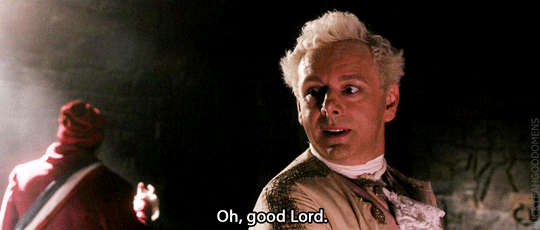
I mean could he climb that tree any faster?
(This is why I really like fics that place a more physical relationship here, pre-Bastille or just post-Bastille, because c'mon look at them. )
In S1 the next thing is 1862 and Crowley asking for insurance (with a cane ffs). And Aziraphale freaking out with his "fraternizing" BS. It's jarring, until we get 1827 filled in for us in S2.
@takeme-totheworld notes in this post:
Crowley sure went from "our respective head offices don't actually care how things get done" and "nobody ever has to know" to "walls have ears" FAST after Edinburgh. And Aziraphale went from looking at Crowley with hearts in his eyes to "I've been FrAtErNiZiNg" just as quickly.
I'm more convinced than ever that Edinburgh was the first time Crowley ever actually got caught and punished for fucking around with Aziraphale/doing good deeds/whatever it was they yanked him back down to Hell for, and it scared the absolute shit out of both of them and changed the whole tone of their relationship after that.
Yes! - it's clear to me as well that the Edinburgh graveyard was a very bad turning point, where they both saw that Hell was listening and would intervene. And it did change their relationship drastically, for over a century and a half (really, until looming Armageddon loosened up the stakes for them).
But what about Heaven?
See the thing is, we know Azi's been worried about Heaven watching him for the past 6000 years.
But they haven't.
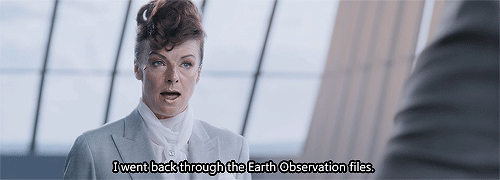

[GIFs posted by starrose17]
All this time, and Heaven had not seen them together. Hadn't noticed. Had not even LOOKED.
I want to mention what @starrose17 says about this here in this post:
What I love about this is her choice of words, “went back through the Earth Observation files.” This implies that these photos were already filed somewhere meaning somebody had to have been watching them which meant somewhere in the depths of the bureaucratic heaven there’s an underpaid angel clerk tasked with watching angels on Earth, and he’s been hording photos of his favourite Angel/Demon couple not reporting them to Michael because he wants to see what happens.
And that's exactly what this fic covers!: Spying Omens by @ednav
(Give this a read, it's fabulous.)
While I am here for this being exactly how that happens, the other scenario is colder and worse - there's no one watching, at all. It's just filing automatically and never seen until some Scrivener is called to pull a file.
From @fuckyeahisawthatat's comment here :
I found this scene to be quite chilling, actually. Not only is the idea of Heaven as a surveillance state brilliant (way to make “God is always watching” sound way more ominous) but this is exactly how modern surveillance states work.
They don’t actively watch everybody all the time. That’s not physically possible for humans, and even if it is metaphysically possible for Heaven, it’s not a very efficient use of resources. Surveillance states watch people they deem “suspicious.” And once you’ve been put in the category of “suspicious,” they have massive amounts of data that they can comb through to collect a lot of information about you–to retroactively build a case justifying why you’re suspicious, to collect information about where you go and who you associate with, etc.
Yes.
So we either have secret collusion in the rank and file, or we have a surveillance state that is constantly reinforced to its subjects for fear's sake, for control.
(Well, it obviously could be both.)
BUT my point is… Up until Edinburgh, Hell has not been watching (or caring at least). And up until near the end of Armageddon't, neither has Heaven.
Oh, my poor Angel. Thousands of years, of denying yourself, of pushing Crowley away, of carrying around a tension that is it's own constellation.
After 1827 you might have reason, but for the 5000+ years before that?
Thousands of years and Heaven was not watching nor cared.
You were right to fear. And you were wrong to believe.
And that just breaks my heart.
#okay gonna go reread Spying Omens again because that's my headcanon now#I hope Azi tears out the Earth Observation cams or servers or whatever it is#where's Murderbot when you need a good hack#good omens meta#aziracrow#ineffable husbands#good omens
243 notes
·
View notes
Text
The long, bloody lineage of private equity's looting

Tomorrow (June 3) at 1:30PM, I’m in Edinburgh for the Cymera Festival on a panel with Nina Allen and Ian McDonald.
Monday (June 5) at 7:15PM, I’m in London at the British Library with my novel Red Team Blues, hosted by Baroness Martha Lane Fox.

Fans of the Sopranos will remember the “bust out” as a mob tactic in which a business is taken over, loaded up with debt, and driven into the ground, wrecking the lives of the business’s workers, customers and suppliers. When the mafia does this, we call it a bust out; when Wall Street does it, we call it “private equity.”
It used to be that we rarely heard about private equity, but then, as national chains and iconic companies started to vanish, this mysterious financial arrangement popped up with increasing frequency. When a finance bro’s presentation on why Olive Garden needed to be re-orged when viral, there was a lot off snickering about the decline of a tacky business whose value prop was unlimited carbs. But the bro was working for Starboard Value, a hedge fund that specialized in buhying out and killing off companies, pocketing billions while destroying profitable businesses.
https://www.salon.com/2014/09/17/the_real_olive_garden_scandal_why_greedy_hedge_funders_suddenly_care_so_much_about_breadsticks/
Starboard Value’s game was straightforward: buy a business, load it with debt, sell off its physical plant — the buildings it did business out of — pay itself, and then have the business lease back the buildings, bleeding out money until it collapsed. They pulled it with Red Lobster,and the point of the viral Olive Garden dis track was to soften up the company for its own bust out.
The bust out tactic wasn’t limited to mocking middlebrow family restaurants. For years, the crooks who ran these ops did a brisk trade in blaming the internet. Why did Sears tank? Everyone knows that the 19th century business was an antique, incapable of mounting a challenge in the age of e-commerce. That was a great smokescreen for an old-fashioned bust out that saw corporate looters make off with hundreds of millions, leaving behind empty storefronts and emptier pension accounts for the workers who built the wealth the looters stole:
https://prospect.org/economy/vulture-capitalism-killed-sears/
Same goes for Toys R Us: it wasn’t Amazon that killed the iconic toy retailer — it was the PE bosses who extracted $200m from the chain, then walked away, hands in pockets and whistling, while the businesses collapsed and the workers got zero severance:
https://www.washingtonpost.com/news/business/wp/2018/06/01/how-can-they-walk-away-with-millions-and-leave-workers-with-zero-toys-r-us-workers-say-they-deserve-severance/
It’s a good racket — for the racketeers. Private equity has grown from a finance sideshow to Wall Street’s apex predator, and it’s devouring the real economy through a string of audactious bust outs, each more consequential and depraved than the last.
As PE shows that it can turn profitable businesses gigantic windfalls, sticking the rest of us with the job of sorting out the smoking craters they leave behind, more and more investors are piling in. Today, the PE sector loves a rollup, which is when they buy several related businesses and merge them into one firm. The nominal business-case for a rollup is that the new, bigger firm is more “efficient.” In reality, a rollup’s strength is in eliminating competition. When all the pet groomers, or funeral homes, or urgent care clinics for ten miles share the same owner, they can raise prices, lower wages, and fuck over suppliers.
They can also borrow. A quirk of the credit markets is that a standalone small business is valued at about 3–5x its annual revenues. But if that business is part of a large firm, it is valued at 10–20x annual turnover. That means that when a private equity company rolls up a comedy club, ad agency or water bottler (all businesses presently experiencing PE rollup), with $1m in annual revenues, it shows up on the PE company’s balance sheet as an asset worth $10–20m. That’s $10–20m worth of collateral the PE fund can stake for loans that let it buy and roll up more small businesses.
2.9 million Boomer-owned businesses, employing 32m people, are expected to sell in the next couple years as their owners retire. Most of these businesses will sell to PE firms, who can afford to pay more for them as a prelude to a bust out than anyone intending to operate them as a productive business could ever pay:
https://pluralistic.net/2022/12/16/schumpeterian-terrorism/#deliberately-broken
PE’s most ghastly impact is felt in the health care sector. Whole towns’ worth of emergency rooms, family practices, labs and other health firms have been scooped up by PE, which has spent more than $1t since 2012 on health acquisitions:
https://pluralistic.net/2022/11/17/the-doctor-will-fleece-you-now/#pe-in-full-effect
Once a health care company is owned by PE, it is significantly more likely to commit medicare fraud. It also cuts wages and staffing for doctors and nurses. PE-owned facilities do more unnecessary and often dangerous procedures. Appointments get shorter. The companies get embroiled in kickback scandals. PE-backed dentists hack away at children’s mouths, filling them full of root-canals.
https://pluralistic.net/2022/11/17/the-doctor-will-fleece-you-now/#pe-in-full-effect
The Healthcare Private Equity Association boasts that its members are poised to spend more than $3t to create “the future of healthcare.”
https://hcpea.org/#!event-list
As bad as PE is for healthcare, it’s worse for long-term care. PE-owned nursing homes are charnel houses, and there’s a particularly nasty PE scam where elderly patients are tricked into signing up for palliative care, which is never delivered (and isn’t needed, because the patients aren’t dying!). These fake “hospices” get huge payouts from medicare — and the patient is made permanently ineligible for future medicare, because they are recorded being in their final decline:
https://pluralistic.net/2023/04/26/death-panels/#what-the-heck-is-going-on-with-CMS
Every part of the health care sector is being busted out by PE. Another ugly PE trick, the “club deal,” is devouring the medical supply business. Club deals were huge in the 2000s, destroying rent-controlled housing, energy companies, Mervyn’s department stores, Harrah’s, and Old Country Joe. Now it’s doing the same to medical supplies:
https://pluralistic.net/2021/05/14/billionaire-class-solidarity/#club-deals
Private equity is behind the mass rollup of single-family homes across America. Wall Street landlords are the worst landlords in America, who load up your rent with junk fees, leave your home in a state of dangerous disrepair, and evict you at the drop of a hat:
https://pluralistic.net/2021/08/16/die-miete-ist-zu-hoch/#assets-v-human-rights
As these houses decay through neglect, private equity makes a bundle from tenants and even more borrowing against the houses. In a few short years, much of America’s desperately undersupplied housing stock will be beyond repair. It’s a bust out.
You know all those exploding trains filled with dangerous chemicals that poison entire towns? Private equity bust outs:
https://pluralistic.net/2022/02/04/up-your-nose/#rail-barons
Where did PE come from? How can these people look themselves in the mirror? Why do we let them get away with it? How do we stop them?
Today in The American Prospect, Maureen Tkacik reviews two new books that try to answer all four of these questions, but really only manage to answer the first three:
https://prospect.org/culture/books/2023-06-02-days-of-plunder-morgenson-rosner-ballou-review/
The first of these books is These Are the Plunderers: How Private Equity Runs — and Wrecks — America by Gretchen Morgenson and Joshua Rosner:
https://www.simonandschuster.com/books/These-Are-the-Plunderers/Gretchen-Morgenson/9781982191283
The second is Plunder: Private Equity’s Plan to Pillage America, by Brendan Ballou:
https://www.hachettebookgroup.com/titles/brendan-ballou/plunder/9781541702103/
Both books describe the bust out from the inside. For example, PetSmart — looted for $30 billion by RaymondSvider and his PE fund BC Partners — is a slaughterhouse for animals. The company systematically neglects animals — failing to pay workers to come in and feed them, say, or refusing to provide backup power to run during power outages, letting animals freeze or roast to death. Though PetSmart has its own vet clinics, the company doesn’t want to pay its vets to nurse the animals it damages, so it denies them care. But the company is also too cheap to euthanize those animals, so it lets them starve to death. PetSmart is also too cheap to cremate the animals, so its traumatized staff are ordered to smuggle the dead, rotting animals into random dumpsters.
All this happened while PetSmart’s sales increased by 60%, matched by growth in the company’s gross margins. All that money went to the bust out.
https://www.forbes.com/sites/antoinegara/2021/09/27/the-30-billion-kitty-meet-the-investor-who-made-a-fortune-on-pet-food/
Tkacik says these books show that we’re finally getting wise to PE. Back in the Clinton years, the PE critique painted the perps as sharp operators who reduced quality and jacked up prices. Today, books like these paint these “investors” as the monsters they are — crooks whose bust ups are crimes, not clever finance hacks.
Take the Carlyle Group, which pioneered nursing home rollups. As Carlyle slashed wages, its workers suffered — but its elderly patients suffered more. Thousands of Carlyle “customers” died of “dehydration, gangrenous bedsores, and preventable falls” in the pre-covid years.
https://www.washingtonpost.com/business/economy/opioid-overdoses-bedsores-and-broken-bones-what-happened-when-a-private-equity-firm-sought-profits-in-caring-for-societys-most-vulnerable/2018/11/25/09089a4a-ed14-11e8-baac-2a674e91502b_story.html
KKR, another PE monster, bought a second-hand chain of homes for mentally disabled adults from another PE company, then squeezed it for the last drops of blood left in the corpse. KKR cut wages to $8/hour and increased shifts to 36 hours, then threatened to have workers who went home early arrested and charged with “patient abandonment.” Many of these homes were often left with no staff at all, with patients left to starve and stew in their own waste.
PE loves to pick on people who can’t fight back: kids, sick people, disabled people, old people. No surprise, then, that PE loves prisons — the ultimate captive audience. HIG Capital is a $55b fund that owns TKC Holdings, who got the contract to feed the prisoners at 400 institutions. They got the contract after the prisons fired Aramark, owned by PE giant Warburg Pincus, whose food was so inedible that it provoked riots. TKC got a million bucks extra to take over the food at Michigan’s Kinross Correctional Facility, then, incredibly, made the food worse. A chef who refused to serve 100 bags of rotten potatoes (“the most disgusting thing I’ve seen in my life”) was fired:
https://www.wzzm13.com/article/news/local/michigan/prison-food-worker-i-was-fired-for-refusing-to-serve-rotten-potatoes/69-467297770
TKC doesn’t just operate prison kitchens — it operates prison commissaries, where it gouges prisoners on junk food to replace the inedible slop it serves in the cafeteria. The prisoners buy this food with money they make working in the prison workshops, for $0.10–0.25/hour. Those workshops are also run by TKC.
Tkacic traces private equity back to the “corporate raiders” of the 1950s and 1960s, who “stealthily borrowed money to buy up enough shares in a small or midsized company to control its biggest bloc of votes, then force a stock swap and install himself as CEO.”
The most famous of these raiders was Eli Black, who took over United Fruit with this gambit — a company that had a long association with the CIA, who had obligingly toppled democratically elected governments and installed dictators friendly to United’s interests (this is where the term “banana republic” comes from).
Eli Black’s son is Leon Black, a notorious PE predator. Leon Black got his start working for the junk-bonds kingpin Michael Milken, optimizing Milken’s operation, which was the most terrifying bust out machine of its day, buying, debt-loading and wrecking a string of beloved American businesses. Milken bought 2,000 companies and put 200 of them through bankruptcy, leaving the survivors in a brittle, weakened state.
It got so bad that the Business Roundtable complained about the practice to Congress, calling Milken, Black, et al, “a small group is systematically extracting the equity from corporations and replacing it with debt, and incidentally accumulating major wealth.”
Black stabbed Milken in the back and tanked his business, then set out on his own. Among the businesses he destroyed was Samsonite, “a bankrupt-but-healthy company he subjected to 12 humiliating years of repeated fee extractions, debt-funded dividend payments, brutal plant closings, and hideous schemes to induce employees to buy its worthless stock.”
The money to buy Samsonite — and many other businesses — came through a shadowy deal between Black and John Garamendi, then a California insurance commissioner, now a California congressman. Garamendi helped Black buy a $6b portfolio of junk bonds from an insurance company in a wildly shady deal. Garamendi wrote down the bonds by $3.9b, stealing money “from innocent people who needed the money to pay for loved ones’ funerals, irreparable injuries, etc.”
Black ended up getting all kinds of favors from powerful politicians — including former Connecticut governor John Rowland and Donald Trump. He also wired $188m to Jeffrey Epstein for reasons that remain opaque.
Black’s shady deals are a marked contrast with the exalted political circles he travels in. Despite private equity’s obviously shady conduct, it is the preferred partner for cities and states, who buy everything from ambulance services to infrastructure from PE-owned companies, with disastrous results. Federal agencies turn a blind eye to their ripoffs, or even abet them. 38 state houses passed legislation immunizing nursing homes from liability during the start of the covid crisis.
PE barons are shameless about presenting themselves as upstanding cits, unfairly maligned. When Obama made an empty promise to tax billionaires in 2010, Blackstone founder SteveS chwarzman declared, “It’s a war. It’s like when Hitler invaded Poland in 1939.”
Since we’re on the subject of Hitler, this is a good spot to bring up Monowitz, a private-sector satellite of Auschwitz operated by IG Farben as a slave labor camp to make rubber and other materiel it supplied at a substantial markup to the wermacht. I’d never heard of Monowitz, but Tkacik’s description of the camp is chilling, even in comparison to Auschwitz itself.
Farben used slave laborers from Auschwitz to work at its rubber plant, but was frustrated by the logistics of moving those slaves down the 4.5m stretch of road to the facility. So the company bought 25,000 slaves — preferring children, who were cheaper — and installed them in a co-located death-camp called Monowitz:
https://www.commentary.org/articles/r-tannenbaum/the-devils-chemists-by-josiah-e-dubois-jr/
Monowitz was — incredibly — worse than Auschwitz. It was so bad, the SS guards who worked at it complained to Berlin about the conditions. The SS demanded more hospitals for the workers who dropped from beatings and overwork — Farben refused, citing the cost. The factory never produced a steady supply of rubber, but thanks to its gouging and the brutal treatment of its slaves, the camp was still profitable and returned large dividends to Farben’s investors.
Apologists for slavery sometimes claim that slavers are at least incentivized to maintain the health of their captive workforce. This was definitely not true of Farben. Monowitz slaves died on average after three months in the camp. And Farben’s subsidiary, Degesch, made the special Zyklon B formulation used in Auschwitz’s gas chambers.
Tkacik’s point is that the Nazis killed for ideology and were unimaginably cruel. Farben killed for money — and they were even worse. The banality of evil gets even more banal when it’s done in service to maximizing shareholder value.
As Farben historian Joseph Borkin wrote, the company “reduced slave labor to a consumable raw material, a human ore from which the mineral of life was systematically extracted”:
https://www.scribd.com/document/517797736/The-Crime-and-Punishment-of-I-G-Farben
Farben’s connection to the Nazis was a the subject of Germany’s Master Plan: The Story of Industrial Offensive, a 1943 bestseller by Borkin, who was also an antitrust lawyer. It described how Farben had manipulated global commodities markets in order to create shortages that “guaranteed Hitler’s early victories.”
Master Plan became a rallying point in the movement to shatter corporate power. But large US firms like Dow Chemical and Standard Oil waged war on the book, demanding that it be retracted. Borkin was forced into resignation and obscurity in 1945.
Meanwhile, in Nuremberg, 24 Farben executives were tried for their war crimes, and they cited their obligations to their shareholders in their defense. All but five were acquitted on this basis.
Seen in that light, the plunderers of today’s PE firms are part of a long and dishonorable tradition, one that puts profit ahead of every other priority or consideration. It’s a defense that wowed the judges at Nuremberg, so should we be surprised that it still plays in 2023?
Tkacik is frustrated that neither of these books have much to offer by way of solutions, but she understands why that would be. After all, if we can’t even close the carried interest tax loophole, how can we hope to do anything meaningful?
“Carried interest” comes up in every election cycle. Most of us assume it has something to do with “interest payments,” but that’s not true. The carried interest loophole relates to the “interest” that 16th-century sea captains had in their cargo. It’s a 600-year-old tax loophole that private equity bosses use to pay little or no tax on their billions. The fact that it’s still on the books tells you everything you need to know about whether our political class wants to do anything about PE’s plundering.
Notwithstanding Tkacik’s (entirely justified) skepticism of the weaksauce remedies proposed in these books, there is some hope of meaningful action. Private equity’s rollups are only possible because they skate under the $101m threshold for merger scrutiny. However, there is good — but unenforced — law that allows antitrust enforcers to block these mergers. This is the “incipiency standard” — Sec 7 of the Clayton Act — the idea that a relatively small merger might not be big enough to trigger enforcement action on its own, but regulators can still act to block it if it creates an incipient monopoly.
https://pluralistic.net/2022/12/16/schumpeterian-terrorism/#deliberately-broken
The US has a new crop of aggressive — fearless — top antitrust enforcers and they’ve been systematically reviving these old laws to go after monopolies.
That’s long overdue. Markets are machines for eroding our moral values: “In comparison to non-market decisions, moral standards are significantly lower if people participate in markets.”
https://web.archive.org/web/20130607154129/https://www.uni-bonn.de/Press-releases/markets-erode-moral-values
The crimes that monsters commit in the name of ideology pale in comparison to the crimes the wealthy commit for money.

Catch me on tour with Red Team Blues in Edinburgh, London, and Berlin!
If you’d like an essay-formatted version of this post to read or share, here’s a link to it on pluralistic.net, my surveillance-free, ad-free, tracker-free blog:
https://pluralistic.net/2023/06/02/plunderers/#farbenizers

[Image ID: An overgrown graveyard, rendered in silver nitrate monochrome. A green-tinted businessman with a moneybag in place of a head looms up from behind a gravestone. The right side of the image is spattered in blood.]
#pluralistic#kkr#lootersprivate equity#plunderers#books#reviews#monsters#nazis#godwin's law#godwins law#auschwitz#ig farben#pe#business#barbarians#united fruit#carried interest#corporate raiders#junk bonds#michael milliken#ensemble cast#carlyle group#monowitz#leon black
1K notes
·
View notes
Text
Ineffable Bureaucracy Headcanons
How I feel Beelzebub and Gabriel would be in their relationship :)
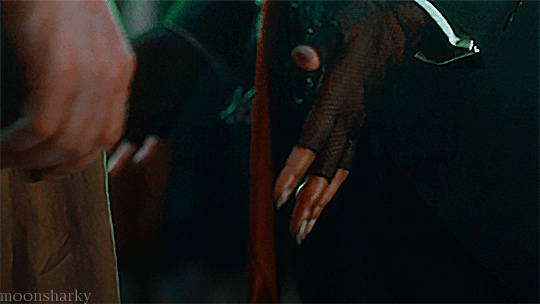
Beelzebub's main love language is gift giving, obviously
I feel like Gabriel's is quality time or acts of service
That being said, they both strike me as the type of people to be very touchy and physical
You know that one couple that just can't keep their hands off each other for five seconds? Yeah, that's them
I saw a post saying that they hc that they didn't actually go to alpha centauri and just went to Edinburgh to fuck with the humans, and honestly? Yeah
I can see them being the couple that everyone knows
Like, everyone in Edinburgh knows about the weird goth and their nerdy ass boyfriend, and they know to not fuck with them
If anyone were to hit on Beelzebub, Gabriel knows that Beelzebub can handle themself, but he also wouldn't pass up the chance to be passive aggressive
"Aren't they attractive? I know they're so attractive. That's why they're my partner. Now, can you leave us alone? We're on a date :)"
Now, if Gabriel was getting hit on, that motherfucker is dead
"Hey, Bee, where did that person go? The one that was being really nice and asking for my 'number.' Whatever that is"
"Oh, they may or may not be dead somewhere"
"Cool :D"
Gabriel can see when other people are hitting on Beelzebub but he doesn't know when he's getting hit on
I feel like on one hand they wouldn't get a house because neither of them would see the point in it, but I also feel like Beelzebub would pester Gabriel into getting one because they're so used to being able to just lounge around and having things (because of how crowded Hell is)
Gabriel wouldn't understand it at all, but he would get a house if it meant making Beelzebub happy
Gabriel definitely starts giving in to human things, like certain foods and drinks, and maybe even sleeping
He would only sleep if it meant cuddles with Beezlebub
If Bee's not there, he's not sleeping
Beelzebub is the big spoon. Gabriel loves being held
But, when Beelzebub wants to be the little spoon, Gabriel is more than okay with being the big spoon
They're such a holdable size for him, so how can he say no?
Gabriel would hear about Valentine's day and go all out
A bouquet of flowers, chocolate, fancy and cheesy card, cute date. Everything
Beelzebub thinks it's adorable and dorky
When they're out in public they'd protect all the flies
It would start because Gabriel would insist on making sure humans didn't kill them because "it's wrong to kill" we all know it's because he loves his fly partner though
And then Beelzebub slowly got into it because they were used to seeing humans kill flies constantly, but Gabriel is just too cute for them to resist and it's not like they could stop him
They'd just be really sweet and wholesome with each other (but if anyone else talks to them, they're complete dicks lol)
#good omens#good omens 2 spoilers#go2#go2 spoilers#ineffable bureaucracy#good omens beelzebub#good omens gabriel#gabriel#beelzebub#gabriel x beelzebub
550 notes
·
View notes
Text
Oops, yesterday was #LoveHornbillsDay and I missed it, so here are a bunch of them to make up for it!

Hornbills plate from page 532 of Edinburgh Journal of Natural History and of the Physical Sciences, 1835.
#bird#birds#birds in art#Hornbill#Bucerotidae#natural history art#scientific illustration#ornithological illustration#Edinburgh Journal of Natural History and of the Physical Sciences#19th century art#British art#European art#illustration#works on paper#Love Hornbills Day#animals in art
23 notes
·
View notes
Text
History time:
Mr. Dalrymple, the eminent surgeon in episode 3 of S2 of Good Omens, appears to be inspired by Robert Knox, an Edinburgh surgeon famous because of his connection to the Burke and Hare murders in the 1820s.
He became an anatomist at the Edinburgh College of Surgeons in Newington and quickly developed a reputation as a lecturer that guaranteed him a steady flow of students, but as with Dalrymple in the show, the shortage of available cadavers was a constant and persistent problem in the city.
Since it gets a bit grisly, I'll pop it behind a thingie.
Graverobbing became so common that many of the graveyards in the city installed watchtowers to keep an eye on the graveyards and some of them had mortsafes put in place:

The coffins were locked in these cages to give the bodies time to get to the stage of decay that would render them useless to anatomists, then popped in a grave afterwards.
This is where Burke and Hare enter this story. They lived in the slums of the old town of Edinburgh and learned that the surgeons would provide money in exchange for fresh bodies, so rather than dig up the graves and risk the watchmen, they cut out the middleman and started murdering people for profit.
Robert Knox was their primary customer and he claimed to be oblivious to the crimes that were being committed, even though Burke and Hare were showing up with unsettling regularity with fresh corpses, but since they were killing the poor, no one was really paying much attention.
According to Mr. Knox, he thought the men were picking up corpses from the poor houses, though there is evidence that suggests he was aware of what was happening: one of the victims was a well-known boy with distinctive physical disabilities who would have been well-recognised. According to contemporary accounts, Knox had the young man's head, hands and feet removed, so no one would recognise him.
Since this could never be proven, he wasn't arrested for his part in the whole affair, but he was described as being "deficient in principle and heart" and public opinion spoke loud and clear. He left Edinburgh in disgrace and was eventually also debarred from teaching by the Royal College of Surgeons in England.
Eventually, laws were brought in to prevent grave robbery, but not before dozens of people were killed for profit.
411 notes
·
View notes
Text
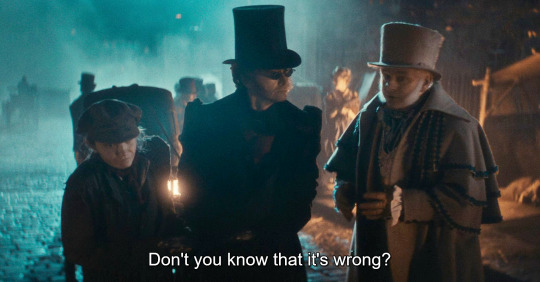
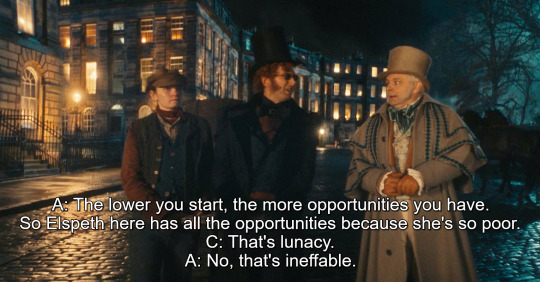
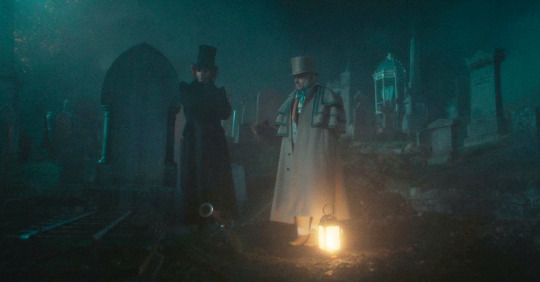
okay so nearly always, crowley stands to aziraphale's left, on the sinister side. but in 1823 edinburgh, when aziraphale protests against bodysnatching and they start discussing his economic theories of potential goodness, it is aziraphale that stands to the left. which feels like a very deliberate choice when they so carefully keep crowley on the left in every other scene with the two of them
so in this, the episode where crowley does an unambiguously good deed and saves a life, while aziraphale has qualms about what counts as goodness, they've also literally swapped positions, changing where they stand in relation to each other both physically as well as morally
#good omens#good omens spoilers#rewatching this scene like 'wait a moment why does it look Wrong to have them standing like that'#mine
404 notes
·
View notes
Text
In Season 2, Aziraphale was Going Too Fast for Crowley
There's two primary reasons this is the case.
The first, is that in this season we saw Aziraphale reaching out to Crowley in ways he hadn't done before. We saw the increase in physical touch, we were told about the increased communication, the whole 'our car, our bookshop' thing and of course, the ball scene.
The second is Crowley's depression and the numerous hints we got this season that he wants to run away from it all.
I'm going to start with premise number two, because it makes me sad and I want it explored first, so the romanticism of Aziraphale can sooth that hurt.
There are multiple ways Crowley's depression is shown to us in this season. The first we see in the very first episode. As he's on the bench with Shax, he asks this:
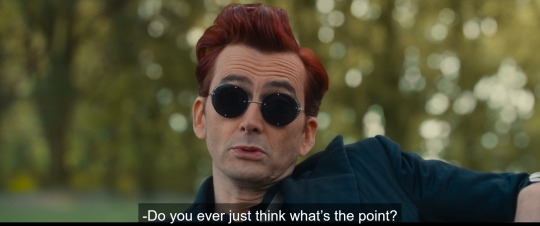
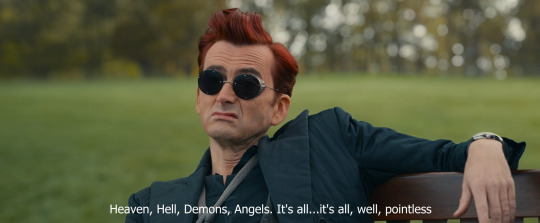
"Do you ever just think what's the point? ... Heaven, Hell, Demons, Angels. It's all... it's all, well, pointless."
This is the first indication we get that Crowley's depressed. He's struggling to care but also - and this will be a running theme - he wants to run away from it all. He doesn't want them to be his problem anymore. He doesn't see the point of them anymore.
But the biggest demonstration of his depression is his relationship with the Bentley this season.
He's literally living in his car. And we see no indication that he wants to it be any other way. It's insignificant to Aziraphale. They don't bring it up at all. It's not mentioned between them. Which means it's a status quo that's been established and set in stone.
When Aziraphale returns with the Bentley after his jaunt to Edinburgh, Crowley is literally waiting at the door to the bookshop with his plants, almost anxiously.
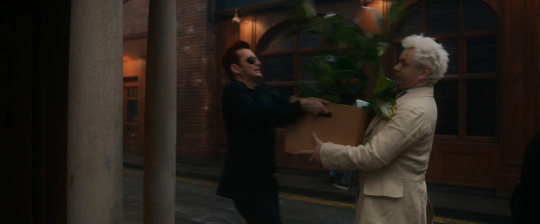
He's ready to shove a box into Aziraphale's arms the moment he steps near the door. "There you are!" Crowley exclaims as he shoves a box of plants in Aziraphale's arms. And while Aziraphale is a bit shocked at being met so suddenly, he's not surprised Crowley is going back to the Bentley. He even helped.
But why? Yes, he loves the Bentley, it is his world, he's extraordinarily connected to it. But I also think it's more than that.
The Bentley is literally his get-away vehicle. He doesn't want to deal with Heaven, Hell and all that lot. But he's also depressed. He's lost his flat, most of his plants, he no longer has the structure of Hell to fall back on. He's listless. But through it all, he has the Bentley. If he wants to leave, if things get to be too much, he can leave in the Bentley. He's already wanted to do it in season one, when he offered to literally drive them to Alpha Centauri.
This makes the scene where Aziraphale refers to the bookshop and the Bentley as theirs hit a little bit harder. For Aziraphale, the bookshop is safety and it's staying put. It's consistency. For Crowley the Bentley is an escape, in a very literal manner.
Which brings us to Aziraphale.
This season Aziraphale was reaching out, the scene above with the 'our Bentley' being one of those moments. But other moments is the increased touching they're doing. There's a lack of distance between them there's never been before. Aziraphale is reaching out physically and emotionally (our Bentley scene), like in these moments:

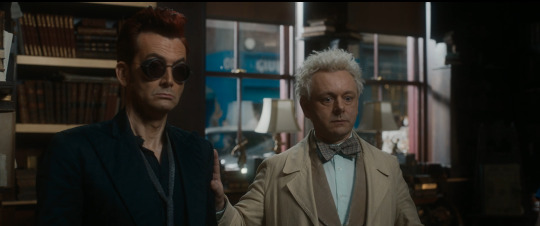
But of course, then there's also the Jane Austen ball, that was "supposedly" for Maggie and Nina, but let's be real, it was as much for himself and Crowley as it was for them.
But before I get into that, lets look at a moment after Aziraphale first proposes the plan.
Muriel is poking around the Nina and Maggie thing, and Crowley says to them, "Don't hesitate to ask me if you have any other questions about love."
And Aziraphale goes on one of those lovely face journeys Michael Sheen is so very good at. He looks all at once, hopeful, nervous, tentative and like he's gearing up for something. He sucks in a breathe and then blows it out silently. There's a lovely little gif of the moment which you can find here. But here's a couple of screengrabs as well.
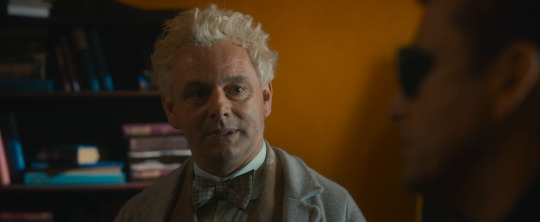

He does this little silent out take of air as if needing a moment to gather himself because Crowley was acting like a master of love and Aziraphale was planning on them dancing together and realising they were in love.
Oh, right lets get back to that.
Okay, so when they were spitballing ideas about how to get Maggie and Nina to fall in love, Aziraphale comes up with this:
"People would gather and do some formal dancing and then realise they had misunderstood each other and were actually deeply in love."
Coupled with the increased physical affection, the whole thing with the Bentley and then Aziraphale's actions during the 'ball', it's clear he's ramping up to 'something'. I'm still personally of the opinion that as angels and sex-less beings there won't be much of an element of 'sex' or even kissing to their relationship. But Aziraphale was leading up to 'ramping up' their relationship, giving it a new title, possibly even cohabitation, one day.
During the ball scene, when Crowley joins Aziraphale, Michael has another lovely little facial journey where you can see Aziraphale working up the courage to invite Crowley to dance.


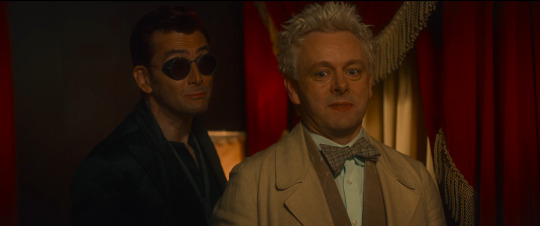
And then, when he does work up the courage to ask (or rather demand), he's absolutely giddy about it. (side not: that is also an amusing range of expressions for David there too)
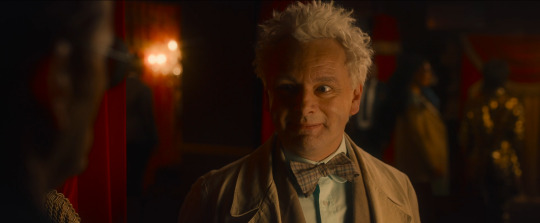

But he's not listening. Aziraphale is too wrapped up in his fantasy to see what's happening with Crowley in front of him. And it's not something Crowley is expecting from Aziraphale either. In that last image, the focus is on Crowley and he's confused, bemused. Not angry, though, even though he's being ignored or even worried, in that moment, about the looming demon threat. Merely confused about Aziraphale's reaction.
So, we've got Crowley's depression and his desire to run away from everything, we've got Aziraphale's attempts to bring them closer together working himself up to a confession and then we've also got the outside pressures.
Nina, assuming they're together. The tension of Gabriel there in Aziraphale's shop, the strengthening risk from Heaven and Hell, the demon attack on the bookshop, Armageddon 2.0 readying and then Crowley gets the final push.
Gabriel and Beelzebub are in love, and choosing each other over their respective sides and positions, coupled with Maggie's meddling.
Prior to Nina and Maggie coming into the bookshop, Crowley tidies the bookshop and he clearly is making plans for them to go off together for an "extremely alcoholic breakfast at the Ritz." Their celebration place, their 'us' place, but with the extremely alcoholic and public segment of it, not likely a breakfast for hearts to be laid out. Crowley's not planning that, he simply thinks they need to unwind for a moment before he lays out the whole 'Armageddon 2.0 bit.'
And then Maggie says this:
"Because you and Mr. Fell don't ever talk to each other. You never say what your really thinking. It was all we needed; It's what you two need as well."
And he's been given an answer. Armageddon 2.0 is coming, Gabriel and Beelzebub just ran away together, but maybe if he lays his cards on the table, this at least will be fine.
But he hasn't dealt with his depression, he hasn't worked through his 'need to run away' issues, he hasn't dealt with losing Aziraphale in the fire and then Aziraphale comes in with the Metatron's offer for him to return to Heaven. And suddenly every other road bar offering up his heart is closed. And so he does.
And it's a mess. It's impulsive, and unscripted and it's painful, raw and unorganised, he can hardly get the words out, it's all in a rush.
Because Crowley, at his heart, wasn't ready. He wanted the status quo to continue. Aziraphale is ready. He's been gearing up to it the whole season. He's ready to take the next step. But Crowley isn't. He wants to be, but he's pushing himself into it too soon. He has too many issues to work through before he can get to that. So much he needs to work through before he's ready to vulnerable and settled that way. But Aziraphale is still there, ready, going too fast for him.
#and now I just made myself sad#azirpahale#crowley#Crowley's depression#ineffable husbands#good omens 2#good omens#good omens s2 spoilers#gos2#gos2 spoilers
388 notes
·
View notes
Text
Jesse explaining that although all three boys generally experienced the same physical abuse, Roman has internalized his experience as a victim in a different way than Kendall and Connor.
“I would suggest Logan would have cuffed and hit all the boys at different times in their lives. I think the difference for Roman maybe is that he feels like he was bullied in the domestic environment and so we can all react to things in different ways. I think Connor and Kendall probably have experienced that and have managed to accommodate it without it being a big part of their psychology whereas I think Roman being that beaten dog and being - there’s often a dynamic isn’t there with bullied people as sort of needing the feeling of negative attention that you get from that and I think he’s become, not addicted to it, but related to it.”
Excerpt from Firecrotch and Normcore: They Like to Watch (recorded at Edinburgh Fringe Festival) – Aug. 29, 2023
#I haven’t seen it circulate tumblr so I’m not sure how popular this take is here#but I think it fits when you think about Austerlitz and the scripts from The Disruptor and Honeymoon States#I really do wonder so much about Connor’s childhood though#like what on Earth went on in that house while Logan was on his way up#I can see it being both worse and better because on the one hand there’s no one watching but on the other hand…there’s no one watching#Man I wish we had more Connor lore#also endlessly fascinated by Roman’s victim complex#roman roy#kendall roy#logan roy#connor roy#hbo succession#jesse armstrong#cw abuse#cw parental abuse#cw physical abuse
302 notes
·
View notes
Text
@sassasafreeaction i saw your tags on this post and just had the sudden, violent need to talk about them

As someone with a bad case of CPTSD that comes with insane hypervigilance, Crowley's behaviour is not only incredibly familiar but also makes a lot of sense.
He is used to having to watch his back, not just in hell (where it's a matter of life and death/torture) but also on earth, while Aziraphale has a general sense of unease and the urge to be careful only when he thinks he is doing something potentially incriminating. So slipping into the role of protector was easy for Crowley, in his mind Aziraphale needs him to do it because he won't/isn't doing it.
Scenes like the ending of the Edinburgh flashback show us that Crowley is not being paranoid, it is based on actual traumatic experiences.
I imagine it is also the only way he can feel some relief when they're in public. Having the wall in your back, the person you care about in front of you, and the door and windows in your line of sight is calming and soothes that little anxious scratching inside your ribs, but even then it never fully disappears.
He has all his little quirks, like the twirls he does while walking, constantly craning his neck, even the sunglasses, which yes, they hide his eyes, but they also hide his gaze; people cannot see what he is looking at. I doubt he is aware of it, I certainly wasn't until someone pointed out that no matter where I am, I periodically check the entire room, physically moving my body and head to do a 360°, for example. Even when I pay attention to my behaviour, it's instinct, I do it because that's just what my brain thinks it needs to do to be safe (and it was truly needed at some point).
Hopefully, once they actually are safe, Crowley will be able to properly relax (and probably be super exhausted for months if not years), but some habits and a part of the hypervigilance will never go away.
#alex talks good omens#good omens#ineffable husbands#crowley#aziraphale#good omens season 2#go2#good omens meta#aziracrow#crowley x aziraphale#ineffable divorce#using my mental illness to analyse my blorbos like god intended
432 notes
·
View notes
Text
Every single minisode is Aziraphale's memory, and why that's [not?] important
There is extensive meta-analysis, my own included, that Before the Beginning is a doctored memory resulting from erasure of Angel!Crowley, and that the trace of him that is left in Aziraphale's memory is the Starmaker, so that this is what we see at the opening of S2. With this foundation of "some scenes are altered memories," we can critically examine the minisodes and see that, in fact, they are ALL Aziraphale's memories that are potentially subject to doctoring.
Evidence (and exploration) below the cut:
A Companion to Owls
The largest part (S2E2 22:10 to 44:00) Book of Job flashback is book-ended by Aziraphale leaning over the physical Book of Job in his bookshop. We enter the memory when Aziraphale enters it, we leave it when he leaves it. Pretty straightforward.
The Ressurrectionists
Similarly, in S2E3, we begin the first flashback to 1827 with Aziraphale's "dear diary" entry. We flash out each time to Aziraphale: in the car to Edinburgh, getting out of the car at the Ressurrectionist Pub, and with Aziraphale staring up at the statue of Gabriel while standing in the graveyard in Edinburgh, respectively for each of the three flashbacks. This all strongly indicates that we've been in his memory.
Nazi Zombie Flesheaters
I didn't even notice until I was doing research for this that basically the entire episode takes place in 1941. From the end of the main title at 5:00 to 37:50, we never come out of the 1941 story. But what is interesting is what bookends this minisode.
Before the main title, Shax has tricked her way into Aziraphale's car and alludes to a time when a rumor started about our ineffable husbands:
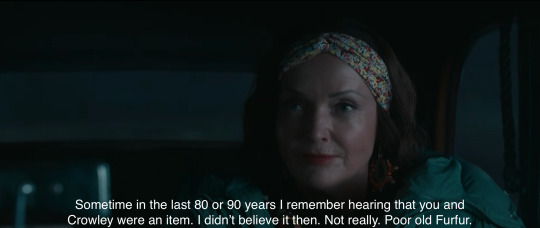
Sometime in the last 80 or 90 years I remember hearing that you and Crowley were an item. I didn't believe it then. Not really. Poor old Furfur.
And when we flash back to modern day, we first go to Hell with Shax proposing a full frontal assault on the bookshop, and then we get:

Aziraphale has arrived back in SOHO, and has spent the 8 hour drive reminiscing about what Shax alluded to.
But this part gets even weirder. Because the final line of the episode is:

You're really hosting the meeting?
Absolutely! And I can guarantee you: it will be a night to remember!
What this means in context of the 3 memory sequence
This line has been taken by a lot of analysts as a reference to A Night to Remember by Walter Lord, a collection of first person accounts of passengers of the Titanic. Most notably, the thematic ties of this work to the cinematographic design of Good Omens are captured by this quote:
A key to Lord's method is his technique of adopting an unconventional approach to the chronology of the event, "[taking] an imaginative approach to time and space in which hours and minutes prove extremely malleable, the ship itself seems almost infinitely complex, and the disaster assumes order and unity from far away."
Which is an amazing connection, and probably true, in that it was a deliberate reference by the writers. "Malleability of time and space" describes well how this show is put together for us the viewer. But it also illustrates how Aziraphale experiences his relationship with Crowley; skipping over centuries at a time, while dwelling on and protracting intimate moments spent together, create a cohesive whole when viewed from a distance. That whole is their relationship. [Which is about to go down like an unsinkable ship.]
But absent the literary reference, we could even take this line for its literal meaning. Aziraphale is talking about forming new memories, after we have spent the last three episodes living in his memories of times with Crowley that were key to shaping their relationship. This isn't a S1E3-style series of allusions to a furtive, flirtatious, and organically blossoming intimacy; these are rough events where the two are shoved into moral quandaries and forced to make some really difficult decisions that bring them closer together and define "their side." These are core memories, and incredibly precious to Aziraphale. And now, after a few short days in which he has spent a lot of time ruminating on these intense memories, he is embarking upon the task of making another important memory, that is, dancing with Crowley.
Why We Care
Because memories can be altered, all of the information we get from these episodes is subject to a reliable narrator problem. As of the Gabriel trial, we know that memories can be doctored even when the person in question isn't present. Crowley knows that his memories have been removed or altered, and has put painful effort into retrieving them. Aziraphale may not realize that he has suffered the same fate. These memories that he holds so dear might not even be true.
Memory, Identity, and the Relevance of Fidelity
We would probably expect to get some "corrections" to these memories in S3, to see exactly what kind of manipulations our heroes suffered and what that reveals about the motivations of the perpetrators. That's how a paranormal mystery story with a memory manipulation element would normally proceed.
But it will be even more significant if we don't; it would speak to a philosophy-of-self that you are not the product of your objective past, but of what you remember, and so we don't get to know what actually happened because it doesn't matter to informing us about who Aziraphale is.
Aziraphale's love for Crowley springs from what he remembers about their shared past; it doesn't necessarily matter that the memories aren't true, because the love is.
~~~
I realize that I kinda buried the lead, so if you reblog, please tag appropriately? I'm taking suggestions.
If you want to read more on this topic, this meta by @ineffable-suffering is a good place to go.
#good omens#good omens 2#good omens meta#aziraphale#crowley#memory#good omens memory#erasure theory#ivoc
258 notes
·
View notes
Text

How to use AO3 (between shoots).
Sequel to "A very cold night in Edinburgh".
This scene should have been more positive and emotional, but… how positive is that? I would like to become an amazed David, wrapped in Michael like a blanket, warm and safe. But reality seeped into the art on Michael's face.
I have to devote all my free time from work to packing things. I have never had so much physical and emotional stress. Moving is still a fuzzy mark on the calendar(
PS. Thank you, @ingravinoveritas
#good omens#good omens season 2#aziraphale#crowley#david tennant#michael sheen#inaffable husbands#aziracrow#victorian style#edinburgh
177 notes
·
View notes